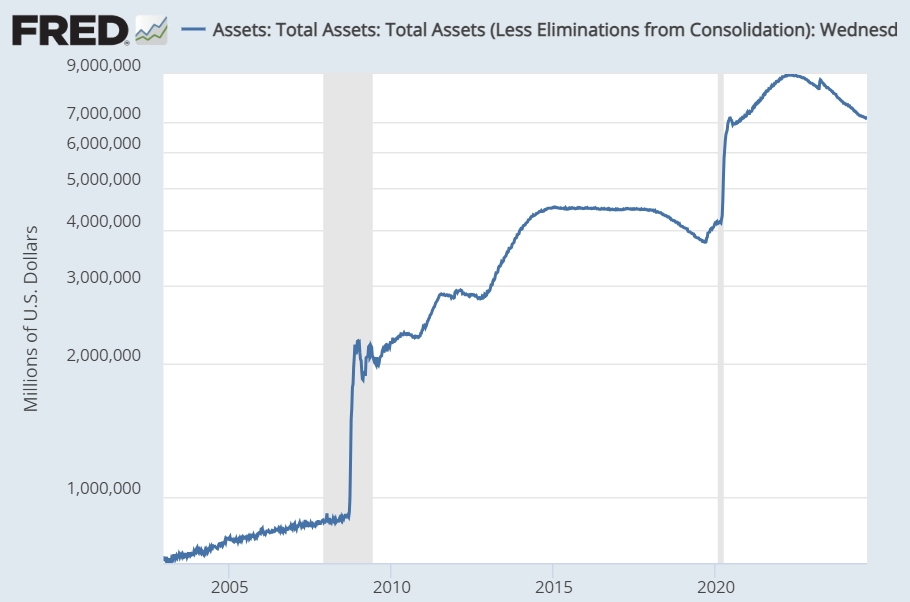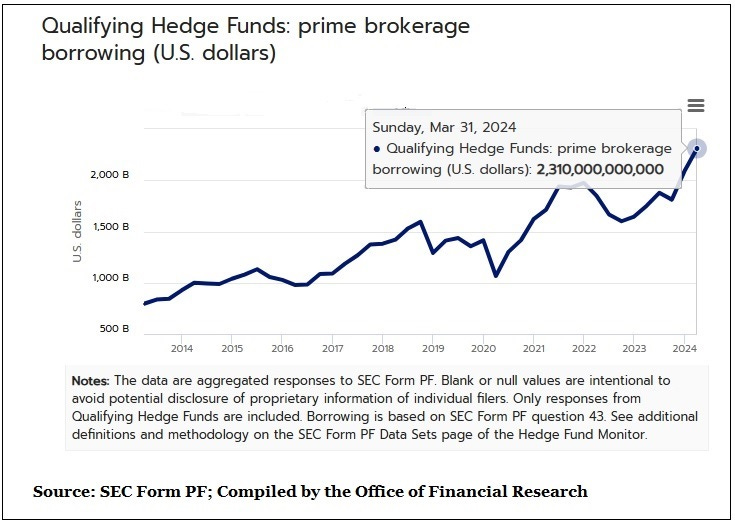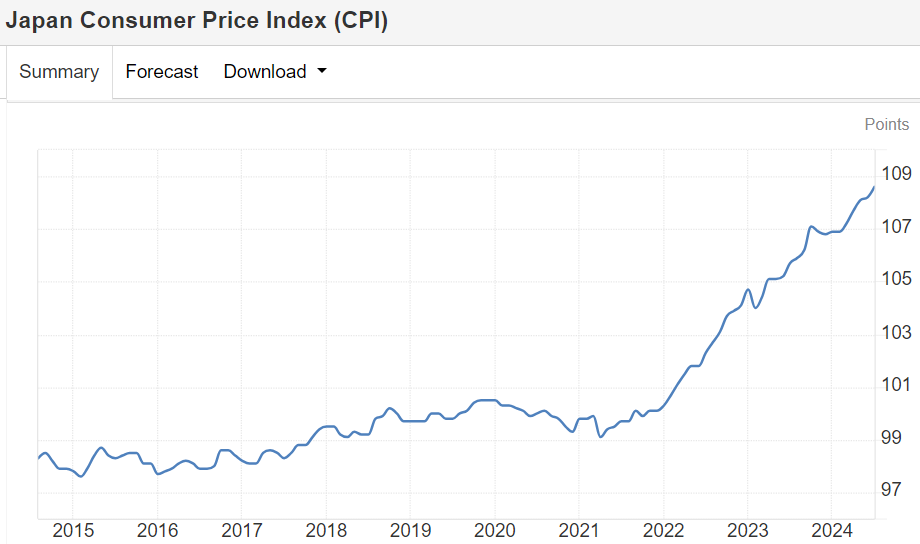“For Volcker, the most important denigrating fact of inflation was…that it undermines trust in government. When we give the government the right to print money…we trust that the government will not debase the currency…When you think about inflation in that context, there is no number – two, four, six. Any number is bad. The only number that works is zero…If you asked Volcker – and I asked him – what's the right number, he said zero.”
On Wednesday, I was on the Macrodirt podcast with the great Tony Greer and Jared Dillian, two traders who have been very nice to me. Mostly I just defend the band Nirvana.
Startup Alarmed When Its AI Starts Rickrolling Clients
Though he's not entirely sure how it happened, the Lindy CEO and founder told TechCrunch that he has a theory about how his AI assistants figured out how to execute this specific brand of internet humor.
"The way these models work is they try to predict the most likely next sequence of text," Crivello explained. "So it starts like, 'Oh, I’m going to send you a video!' So what’s most likely after that? YouTube.com. And then what’s most likely after that?""
Here’s QT So Far…
(So many do not seem to understand this when I post charts: “Logarithmic charts are used for a long term analysis of price changes on a stock or share price. They are commonly used by technical analysts and traders who want to see a percentage change, not a specific dollar value change.”)
Anyway, see if you can tell when the Fed really began distorting housing prices:
Home price-to-income ratio at record high
Melody Wright: Storm Clouds A'Brewin
“I had a guy on here a couple days ago who is like this crazy polymath dude, who just studies history and republics and stuff, and he has this whole theory - comprehensive theory based on historical events - on why there's going to be a Civil War in America after the election, and he talks about how it'll happen, why it'll happen, what are the four reasons it will happen - but what I came to realize is that it feels like you're basing this all off of data that you've been reading online, or from comments that you've been reading online, but you haven't really gone outside and had a conversation with somebody.
I'll say this again, because it's a beautiful analogy to the real world. My friend Julian Dorey came up with this. It's called the Wawa Theory. He says you go online, and you see all this stuff with Candace Owens, Ben Shapiro - all these people on Twitter - that are making it seem like the world is burning, right?
But then you go to Wawa and you see the girl with the green hair holding the door open for the guy with the Vietnam hat on, so it's not really like that. The world's not burning down. It is only to the people that haven't seen sunlight in a decade, who just focus on social media 24/7.”
The usual smorgasbord of content below that I hope the paid subscribers find useful. Some great interviews.
Now I’m off to watch my Chiefs play the Ravens.
“The future earnings expectations for Nvidia are off the charts. I have never seen anything like that in the market ever before.”
Treppwire 274 (A Commercial Real Estate podcast)
The most conservative approach is ‘all in, all the time.’
Americans Are Really, Really Bullish on Stocks Published on September 3. The S&P 500 Index closed out August at
“This melt up is exactly what any investor should be waiting for,” said William Bohrod, a 67-year-old dentist in Springfield, N.J. “The most conservative approach is ‘all in, all the time.’”
Boom! 85%.
"Three Megabanks Had Loans Outstanding of $1.832 Trillion to Giant Hedge Funds on March 31"
Regulators: Why are taxpayers backstopping this?
“Apparently, federal banking regulators have become incapable of learning from the lessons of the past.”
“Logitech’s new CEO has grand ideas for the computer hardware company, and one of them is a “forever mouse” that you’d never have to replace but that you may have to pay for every month.”
How Responsible Is the Rental Housing Cartel for the Explosion in Homelessness?
Let’s focus here on Los Angeles. While the story is the same across many markets, LA also happens to be the epicenter of US homelessness crisis.
Los Angeles County is the 6th largest multifamily market with 448,848 completed units. Strategic Actions for a Just Economy, an LA organization that focuses on tenant rights and economic justice,
in their 2021 report, “Beyond Wall Street Landlords: How Private Equity in the Rental Market Harms Tenants,” found that more than two thirds of all LA Rentals are now owned by speculative investment vehicles.
Corporate landlords named in the RealPage lawsuits include Essex Property Trust, Equity Residential, and AvalonBay Communities — the three biggest players in LA real estate management.
Combined they control 35,020 multifamily units, or 7.8 percent of LA County’s 448,848 units.
According to lawsuits against RealPage and large property management companies, there are another 17 companies that use RealPage’s rent-setting tool in LA, and together, they account for just more than 52 percent of all rental apartment buildings in the LA market. [1]
A separate lawsuit against Santa Barbara-based Yardi, a company similar to RealPage, accuses it of using its RENTmaximizer (now Revenue IQ) product to do exactly what RealPage is accused of doing.
When you throw Yardi into the mix, that means that 79 percent of all multifamily rental units in LA County are being listed using collusion software.
“Hertz Properties Group, an arm of one of the largest owners of office properties in central business districts across the United States, said it has “significant doubts regarding the continued existence of the company.”
“Fear is not in the habit of speaking truth; when perfect sincerity is expected, perfect freedom must be allowed; nor has anyone who is apt to be angry when he hears the truth, any cause to wonder that he does not hear it.”
Jim Walker
“I was in a panel when I was back in Hong Kong in January, just one of the organizations, the YPO, YPO Gold asked me to come onto a panel, and I was sitting there with four other strategists and fund managers talking about their investments for this year, investment strategy. And I was the only one in the panel that was underweight Japan. I was the only one that was overweight India, but the whole panel was unified apart from me and the fact that Japan was a great story. And I would slightly disagree with you, that the domestic economy is doing well. It’s not collapsing, that’s for sure. But people are poorer today than they were a year ago in real terms in Japan, and certainly two years ago, because inflation has been higher than wage increases. Japan has just been overtaken by Korea in terms of its per capita GDP. It’s steadily sliding down the table in Asia. It’s now the fifth- richest GDP per capita country in the world.”
“…at that panel, my point really was that when people are looking at Japan and China, because everybody was anti-China as well, not anti-China, but underweight China. I said, so many people ask me about China’s un-investability. My view is that the un-investable economy and market in Asia is Japan.”
“..the real problem with my view of Japan is that they’re now stuck in this Bernanke hellhole of zero interest rates, trying to get their economy moving, can’t get their economy moving, therefore the currency’s going to just keep going.”
“Everybody talks about the Japanification of Europe, but the Japanese have swallowed the Bernanke Kool-Aid like nobody else, thankfully nobody else, and are suffering the consequences of it now because, again, we were talking earlier and I said Japan’s in a hole as far as its policy making is concerned, but what it does with each new decision is, “Bring me the tunneling equipment. Let’s keep digging.”
“Governments, as I say, don’t pay back debt. This is their big problem. So all of the policies that have been enacted and developed by modern monetary theorists, Keynesians, over the course of the last 50 years have been developed with one thing in mind, to create inflation. Because by creating inflation, you hopefully inflate away the debt burden on government. You go to the statistics on Japanese households and Japanese corporates who have still been paying down debt when interest rates have been zero. They never had a problem with interest rates at four and five. They were paying down debt at four and five as well, because companies and households behave appropriately when they run into debt problems. The only people that don’t are governments.”
The Carry Trade
Grant: “Well what’s interesting about this idea of the Japanese raising by 200 basis points, which would do all the things you say, is that Japan, even though it’s existed in isolation for such a long time, and for a country that used to be the second-largest economy in the world when it was in its glory years, to become essentially irrelevant for such a long period of time, it is remarkable to me. But because of the nature of that irrelevancy, if they raise that 200 basis points, they become very relevant very quickly to just about everybody because of the carry trade. And that sends out ripples to every single corner of the financial markets”
Jim: “It wouldn’t be ripples.”
Grant: “It would be a tsunami.”
Jim: “That would be the tidal wave.”
Grant: “Exactly right.”
Jim: “I’ve got the t-shirt, the Uniqlo t-shirt of the Japan wave, the tidal wave, and that’s exactly what it would be around the world. But that’s again, what these kind of policies have done. They’ve made the global economy a much, much less stable place. Everybody thinks that zero interest rates has saved the world. Zero interest rates has created all sorts of distortions in the world that will come home to roost eventually, or stick people in that hole and keeping digging like Japan. But if we went to 200 basis points, to say it clears everything out, we would probably be looking at stock markets around the globe down 50%.
Is there a point that comes when the Japanese prioritize self-interest?
Because the clue was this week - we are not going to do anything because markets. Markets, not the Japanese market, markets are unstable. We’re good corporate citizens of the central banking world, not the world, but the central banking world. Are they captive, or does the Rubicon appear and they have to cross it at some point?
I feel sorry for Japan because I think they’ve really been sold a pup. They were the people who adopted the Bernanke solution to their economy, and instead of saying, this is a pup that should be put back to the kennels, they’ve nourished it and kept it going and kept it growing to the point that it’s now a full-blown wolf at their door. So they have a very, very difficult job ahead to get themselves out.
Now, in fairness, what the government thought it was doing and what the central bank thought it was doing was the right thing to help reinvigorate the economy. And again, this 2% inflation nonsense that central banks have come up with, why does Japan need 2% inflation, the same as the U.S., the same as New Zealand, the same as the UK, the same as almost everybody, when its population is falling, the economy has been in the doldrums for a long time? And they’ve done everything in their policymaking to get to this 2%. Now they’ve got there, it’s slightly higher and it’s a disaster because people are worse off. Now, yes, we’ve just seen the wage round and it’s probably four or 5%. That doesn’t always translate into 4% or 5% across the board.”
Jim Walker on Twitter One of the good Econ PhD’s.
“We think any company that has an economist, you know, certainly, has one employee too many.”
Marc Cohodes
“It’s this never-ending spiral of guys with money on leverage trying to make a buck at the expense of you and me, and worse - Joe Six-Pack.”
“We’re in a world - good, bad, or indifferent - that just loves kicking the can down the road.”
“Powell can say, ‘Inflation has moderated.” That’s like saying, ‘I used to weigh 190 pounds and now weigh 320, but I should be happy because next month I’m only weighing 326. My rate of change is now slow.’”
“Everyone talks like they want free markets…these aren’t free markets. Free markets force bad operators to fail, and bad operators don’t fail.”
“I’ve seen the S&L crisis, I’ve seen the Russian debt crisis, I’ve seen the GFC - I’ve seen ‘em all. They just find ways to put the patch on it and keep it going.”
FTX
Cohodes was all over this Sam Bankman-Fried fraud while the MSM was still worshipping him.
Jonathan Wellum on the CPI vs the Cost of Living
Michael Every
Great insights from the Global Strategist at Rabobank.
“The Fed in particular, you know, our modern international financial system with the Fed at the center, also is an all-pervasive system in nearly every corner of the global financial market and the global economy, and yet the Fed itself also is a secular religion, with a completely inconsistent, incoherent ideology which pans left one minute and right the next, and completely contradicts itself all the time, and yet no one is ever brave enough - or very few are brave enough - to actually point out the inconsistencies in it. Most of your average portfolio managers just go along with it, even though they're ostensibly well-educated, very intelligent, trying to prudently invest everyone's money.”
“It's interesting now the Sahm Rule is in effect, and Claudia Sam wants to walk away from it, and now offers all these ifs, ands, or buts, but everybody a year ago was talking about the beauty of the Sahm rule when Claudia was going out on her own.”
The fact that Sahm is now “Chief Economist” for “New Century Advisors” - an “institutional investment management firm” - explains a lot . (I do find the name "New Century Advisors" to be ironic.)
After an orgy of bad monetary policy like QE and ZIRP - supported by people like Sahm - she now wants the Fed to cut rates and "Get out of the way."
“If you look at the quality of the data you're getting out of the U.S. now, it's poor. It's really, really poor. If you look at the distortions to the data - particularly you were talking about the labor market - no one knows what's going on with the US labor market. How large is your labor force? We don't even know. Is it the official number? Is it five million larger over the last four years? Is it 10, is it 12 - I've heard 15. I've heard people saying 20 million people more. Now I don't know, and I'm not trying to make a political point - there is a political point, because we don't even have anyone trying to estimate it, because it's too taboo for some people to discuss, and yet the Fed I'm supposed to believe haven't known this conversation is happening, even if it wasn't in the mainstream media until the last few weeks? I can assure you on social media it's been going on vociferously for a long time.”
“Is it really helpful to have zero interest rates if everyone puts it into crypto or into funding a Silicon Valley company that makes cats look like dogs on your phone, so you can entertain yourself at lunch - look, my cat looks like my dog! Or is it going to be more useful to have that liquidity going into rebuilding physical supply chains and technology with a defense spin-off, and is it more useful to give money to everybody, or is it more useful to channel money to people who are going to use it productively to do something for the U.S.A. Inc. That is an entirely political choice. There is no way that you can have a Fed which can use the usual mechanism of here's not enough liquidity, here's too much liquidity - you need to give ample liquidity fiscally and monetarily to people who are doing useful things, and you need to restrict liquidity monetarily and fiscally to people who are doing dumb things. The choice of what is done and what's useful is a political one.
“Deflation is good for consumers by the way. We've forgotten that. The whole financial system doesn't like deflation because it makes it hard to service your debt. Consumers would love a bit of deflation right, now provided they didn't lose their job.”
“You know all the Ivy League grads actually can't do anything anymore. Nothing. They can they can sit there, and expect a pay rise, but they don't know how to work. That's Matthew Pines, and David Goldman was saying if you look at the people running the state department, you know, the senior civil servants running people like Brookings, the think tanks, the whole Acela Corridor - you know, the D.C. crowd - they are absolutely the kind of people I was writing about in the Powell of the Powerless, who live in their own fantasy world. They are just as bad -even though they think they're realists, and they think they get it - they're just as bad as when you had Dick Cheney under George W. Bush saying ‘we create our own reality when we act.’ Do you remember that arrogance, when the US was the unipower? They have the same idiot mindset, with a much, much weaker U.S., and a much, much weaker economy, a much, much stronger and more worldly and realpolitik counterparties on the other side. Yet if you live in a D.C. bubble, you probably still think you're the center of the universe. You're not. You're absolutely not.”
Marvin Barth
Barth interview (Grant Williams has a paywall)
Anecdote Grant Williams mentions in his chat with Marvin Barth
This is Texas Congressman Wesley Hunt:
Very thought-provoking interview. Check out the whole thing if you can. Barth does a lot of analysis of political polling, and comes to the conclusion that Trump is doing several points better than the polls reflect:
“If I go back and look at the 2020 results, what you see there is that polling errors again, Donald Trump’s numbers were understated by about four percentage points nationally. A little less than four, I think it was 3.6%. That’s roughly the same sort of order now. If I look at what that same polling error would be applied right now - based on the real clear politics polling average - it would tell you again, Donald Trump’s probably about two points ahead. Which means that unlike the past two elections, he’s actually probably on track to win the popular vote.”
“If I were to take you to post-World War II voting in the United States - and we really only start tracking this in the mid to late ‘60s - Democrats reliably won at least 90% of the Black vote in the United States. Obama took that up to 95%, 96%. Donald Trump in the last election held Joe Biden to the high 80s by some marks. Other polling would suggest that Donald Trump might’ve gotten as much as 20% of the vote. We also know he made huge gains with Latino voters. If you look at current polling, they’re telling you the same thing, that Donald Trump is getting at least 20% of the Black vote. That is off the charts. That is totally unprecedented for any Republican voter.”
“My fiancée partner is Nigerian. And sometimes we talk about if any of the stuff that was going on in the US was happening in Nigeria, everyone would be like, “Oh, this is pure electoral interference. Oh, this is them trying to steal the election.” But because it’s the US, everybody says, “Oh, no, no, no, no. This is just the rule of law.” Right? It is very clear the Democrats are actively pursuing lawfare against Donald Trump. Whether you believe that he’s a criminal or not, there’s no question this is lawfare. You are trying to keep voters from making that choice and make the choice through another means. And in any other country, we would call that interference with democracy. But somehow in the US, we’ve decided, no, this is not. And that’s not a partisan statement, that is a factual statement of how we would look at this in another country. And I just thought that was so interesting that my fiancée put it in those terms. She’s like, “This would definitely be called stealing the election in Nigeria.” And she’s absolutely right, that is exactly the way we would look at it.”
This passage from Marvin Barth was interesting:
“Hyman Minsky, the economist, postulated that you will just have crises happen if you have too much stability, because it breeds a build-up of unrealized risk in the background. So the more stability you create, the more likelihood you’re going to have a violent eruption of volatility as a result. And that it’s actually better to have lots of little bits of volatility in the meantime, so that you never build up that same amount of systemic risk that gives you one of those big cataclysmic global financial crisis, great depression type events. But the same thing that holds true of politics. And it goes back to exactly what I said about Vladimir Putin saying, “I would prefer Joe Biden because he’s predictable.
So yes, I think it’s scary that we have a president who is not fully mentally competent right now, but I don’t think that’s responsible for the situation we’re in. I think what’s responsible for the situation we’re in is actually decades of good governance by a lot of presidents in a row of both parties that were always focused on stability. Let’s create stability, let’s create stability. Don’t rock the boat. And they did a very good, not rocking the boat. But in the meantime, they allowed the west’s adversaries to build up and get to a position where they can challenge and create a cataclysmic event.
So whether you like Donald Trump or not, for a lot of different reasons, and there are good reasons to be pro or anti Donald Trump, but one of the unalloyed goods I see in Donald Trump, at least for the next four years, is that he injects that necessary amount of volatility into the system. The story that you just described, or my favorite one is the Soleimani assassination. That was a completely unpredictable move that completely set back, not just the Iranians, but the Russians, the Chinese, everyone. Holy cow, this guy is capable of doing anything. And that injection of the potential for risk is actually a stabilizing event, in the same way that we talked about with Minsky moments. Creating little bits of volatility actually is de-risking the system or making it anti-fragile in Taleb’s terminology. And so that is the one clear, unambiguous good I can see from Donald Trump is that actually, my concerns about the geopolitical nature of the world or about the risks there, go down significantly while he’s president, simply because he brings stability through his instability, if that makes any sense.”
On a side note, I think all of the Fed interventions this century have likely created massive underlying cataclysmic financial systemic risk - i.e., a huge fire is coming, because we keep snuffing out all the smaller fires, and letting the underbrush grow massively. Some big people in finance should get burned from time to time. In those cases, concentrate on dousing the fire for those who did not help set it.
Barth on the Chevron Decision:
“The Warren Supreme Court had this decision called the Chevron decision, which effectively told courts henceforth to defer to regulators whenever there was ambiguity in Congress’s laws regarding any type of regulation or issue. And so that’s an immense gift of power to regulators and to the state over business.
In the Raimondo decision this July, the Roberts court overturned Chevron, taking away a tremendous amount of power from regulators. Well, that again, is good for small business relative to large business, who can afford lobbyists and getting regulators on side with them.”
Demetri Kofinas with Bob Kerrey
Kofinas
“The sadness comes from just looking back and seeing that it seems that it could have been stopped. Not could have been stopped because we now connect the dots, but the dots were connected. What's sad is what came out of it. That it seems that all the people responsible not only got away with it, but got promoted.”
“We have the White House saying, "We need to take this country to war, to topple Saddam" - suggesting that he was somehow responsible for 9/11, and he's a big threat -when in fact it was the Saudis and it was the Saudi ambassador cutting checks, literally cutting checks to the guy who was chaperoning hijackers in San Diego.”
Bob Kerrey
“In some way, 9/11 made the case that sometimes secrecy doesn't increase security, it decreases it. I think, in some ways, it's an underreported analysis. Does secrecy make us safer? Not necessarily.”
This is an excellent commentary from Kofinas:
Fox: If you were President, would you declassify - answer yes or no - would you declassify the 9/11 files?
Trump: Yeah.
Me: He was President and did not release many!
Fox: Would you declassify JFK files?
Trump: Yeah. I did a lot of it.
Me: Why not all of it?
Fox: Would you declassify the Epstein files?
Trump: Yeah, yeah, I would all right, I guess I would. I think that less so because, you know, you don't know, you don't want to affect people's lives if it's phony stuff in there, because there's a lot of phony stuff with that whole world, but I think I would .
Fox: Do you think that would restore trust, help restore trust?
Trump: Yeah, I don't know about Epstein so much as I do the others. Certainly about the way he died. It would be interesting to find out what happened there, because that was a weird situation, and the cameras didn't happen to be working.”
Atlantis
Something different I saw mentioned. This is from the Eleventh Edition of the Encyclopedia Britannica, Volume II (1911)
“ATLANTIS, ATALANTIS, or ATLANTICA, a legendary island in the Atlantic Ocean, first mentioned by Plato in the Timaeus. Plato describes how certain Egyptian priests, in a conversation with Solon, represented the island as a country larger than Asia Minor and Libya united, and situated just beyond the Pillars of Hercules (Straits of Gibraltar). Beyond it lay an archipelago of lesser islands. According to the priests, Atlantis had been a powerful kingdom nine thousand years before the birth of Solon, and its armies had overrun the lands which bordered the Mediterranean. Athens alone had withstood them with success. Finally the sea had overwhelmed Atlantis, and had thenceforward become unnavigable owing to the shoals which marked the spot.
In the Critias Plato adds a history of the ideal commonwealth of Atlantis. It is impossible to decide how far this legend is due to Plato's invention, and how far it is based on facts of which no record remains. Medieval writers, for whom the tale was preserved by the Arabian geographers, believed it true, and were fortified in their belief by numerous traditions of islands in the western sea, which offered various points of resemblance to Atlantis. Such in particular were the Greek Isles of the Blest, or Fortunate Islands, the Welsh Avalon, the Portuguese Antilia or Isle of Seven Cities, and St Brendan's island, the subject of many sagas in many languages. These, which are described in separate articles, helped to maintain the tradition of an earthly paradise which had become associated with the myth of Atlantis; and all except Avalon were marked in maps of the 14th and 15th centuries, and formed the object of voyages of discovery, in one case (St Brendan's island) until the i8th century.
In early legends, of whatever nationality, they are almost invariably described in terms which closely resemble Homer's account of the island of the Phaeacians (Od. viii.) a fact which may be an indication of their common origin in some folk-tale current among several races. Somewhat similar legends are those of the island of Brazil (q.v.), of Lyonnesse (q.v.), the sunken land off the Cornish coast, of the lost Breton city of Is, and of Mayda or Asmaide - the French Isle Verte and Portuguese Ilka Verde or “Green Island” - which appears in many folk-tales from Gibraltar to the Hebrides, and until 1853 was marked on English charts as a rock in 44° 48' N. and 26°10' W.
After the Renaissance, with its renewal of interest in Platonic studies, numerous attempts were made to rationalize the myth of Atlantis. The island was variously identified with America, Scandinavia, the Canaries and even Palestine; ethnologists saw in its inhabitants the ancestors of the Guanchos, the Basques or the ancient Italians; and even in the I7th and i8th centuries the credibility of the whole legend was seriously debated, and sometimes admitted, even by Montaigne, Buffon and Voltaire.”
I looked up the above coordinates, which would place Atlantis - if it was real -around here:




























With respect to Atlantis and all the history of which we have no understanding, I quote Don Henley: “The more I know, the less I understand.”
A number of years ago I met an old work colleague from London in a bar in NYC. He was born in Nigeria but moved to the U.K. at an early age but made frequent trips back to Africa. At the time he was working for UBS and had been in the U.S. for almost a year. I asked him how he liked the U.S. and he looked down, hemmed and hawed until I said the country is totally corrupt. His eyes lit up and he went on a rant about how it was as corrupt as Nigeria. The only difference he said was that corruption hadn't been legalized in Nigeria like it has in the U.S.